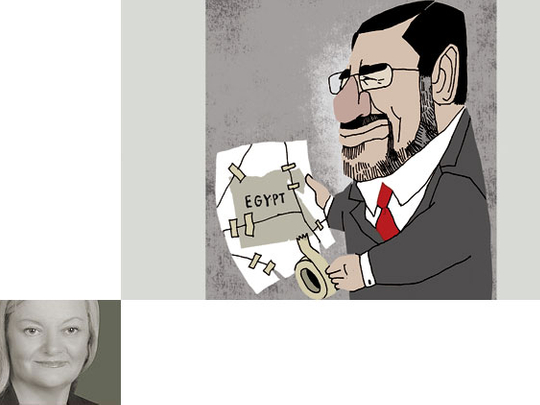
Egyptians are worried and anxious. Throughout their country’s history its people have never been so irreconcilably divided; ironic perhaps when during the January 25 revolution Islamists, liberals and Copts stood shoulder-to-shoulder in the squares chanting “one hand”.
Whatever one’s view of President Mohammad Mursi, his surprise declarations, characterised by his opponents as democracy’s death knell, have torn his nation apart and raised eyebrows among the international community’s decision-makers potentially impacting foreign investment, loans and aid.
If the president is concerned, he is not showing it; rather he looks self-satisfied and relaxed like a cat with a bowl of cream, albeit curdling fast, as he watches his carefully-crafted agenda playing out.
Clearly, he enjoys unbridled approval from the Muslim Brotherhood and other Islamist organisations as witnessed last Saturday when hundreds of thousands gathered in Cairo and Alexandria to spur him on.
Large numbers from the Salafist contingent said they were there to ensure the implementation of “God’s law”. Others waved black Islamist flags and accused anti-Mursi protestors camping out in Tahrir Square, of supporting remnants of the Mubarak regime or being anti-Islam.
The majority of the anti-Mursi crowd are Muslims too, people who would defend their faith with their lives. They are university students, intellectuals, writers, lawyers, businessmen, housewives, the people who ignited the revolution that toppled Mubarak, a revolution that was later hijacked by the Muslim Brotherhood which adopted a moderate visage to suit the circumstances, pledging not to field a presidential candidate or attempt to alter Egypt’s multi-faceted social character.
Demonstrators in Tahrir Square largely understand democracy’s main principle that rests on separation of powers. They hotly reject the concept of temporary autocracy for expediency’s sake as setting a precedent, the slippery slope to yet another dictatorship. And they have been inflamed further by a draft constitution hurriedly approved by an Islamist-dominated constituent assembly during a 16-hour-long all-night session, considered to be rambling with contradictory articles open to various interpretations.
Of most concern are articles infringing upon personal lives, elevating the state to a guardian of morality (whose morality?) and the true nature of the Egyptian family (whatever that is) “as regulated by law”.
To be fair, however, the third paragraph of Article 10 has been widely mischaracterised as enjoining women to balance their duties towards home and work whereas it reads, “The State shall ensure maternal and child health services free of charge, and enable the reconciliation between the duties of a woman towards her family and her work”.
Many articles are commendable especially those stressing the inviolability of national funds, the banning of property sequestering, the exclusion of confessions garnered under duress, and a prohibition against organ trafficking.
In many respects, the draft is reasonable. It needs to be fine-tuned to allow for freedom of the press and the arts, but its critics suspect that it’s heavily laced with an Islamist tint and are committed to throwing out the baby with the bathwater. They are frustrated at being presented with a Hobson’s choice: If they don’t bless the constitution, Mursi will retain his expanded powers until they do.
Superficially, it looks as though Islamists are in the majority even though Mursi was elected by a tiny margin. Had moderates and secularists come together prior to the ballot to form a single party of opposition with one presidential aspirant, the story would have been very different.
Opposition leading lights such as Mohammad Al Baradei, Amr Mousa, Hamdeen Sabahi and Abdul Moneim Aboul Foutouh and tens of parties have now been shocked into joining their voices. But this display of unity may be too late.
I use the word “superficially, because there exists a silent majority and a large proportion of undecideds; people too timid or apathetic to make their voices heard. The upper middle classes prefer to spend their Fridays enjoying brunch in five-star hotels or moaning to their friends in Italian-style al fresco cafes rather than venting their feelings amid noisy, sweaty crowds. That does not mean they do not have clout by virtue of their cash in the bank and investments.
The professional classes such as judges, lawyers and journalists are displaying their outrage over Mursi’s edicts with strikes. The opposition alliance calling itself the National Salvation Front warned that it would fight against “an attempt to kidnap Egypt from its people” and warn of a nationwide general strike with the potential for civil unrest.
Most crucially, moderates lack an inspirational leader; there is no charismatic man of stature among them capable of wooing the nation. Unlike Mursi’s base, they are not organised. When Islamists call their people out to protest, they offer inducements and lay on convoys of buses to transport demonstrators from far-flung areas to Cairo, whereas protesters in Tahrir Square tend to be residents of the capital, its suburbs or nearby towns, arriving on their own steam.
Media doom-merchants are predicting Syria-type scenarios or civil war or envisage Egypt becoming a Sunni mirror-image of Iran. Tensions between the two sides are nearing boiling point so, while such outcomes are unlikely, they cannot be entirely ruled out. It is up to Egypt’s first democratically-elected president to make concessions for the sake of unity and prove them wrong. Should the economy flat-line, his supporters — largely the poor and illiterate — will be rioting over jobs, fuel and bread.
Linda S. Heard is a specialist writer on Middle East affairs. She can be contacted at lheard@gulfnews.com









